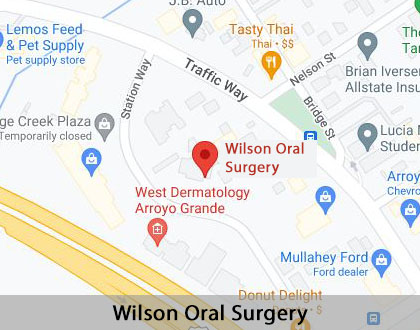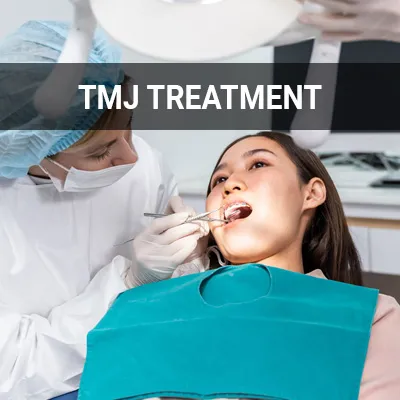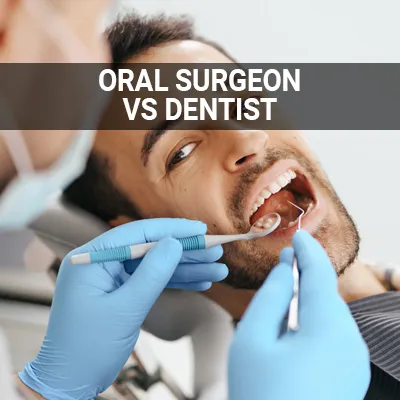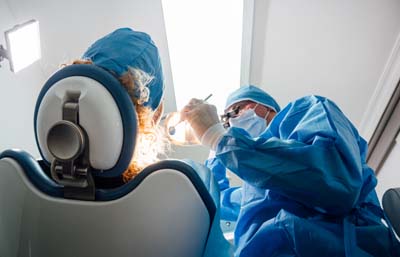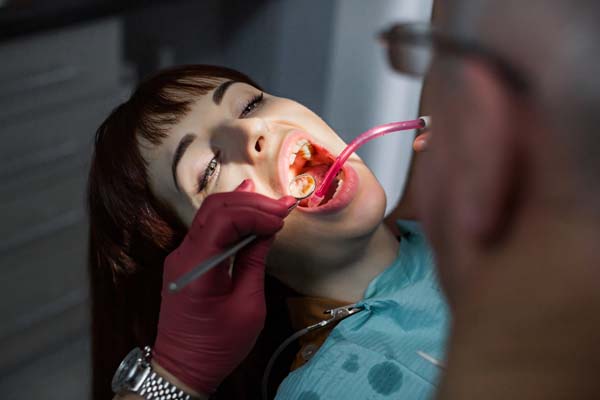Jaw Pain Treatment Arroyo Grande, CA
An oral surgeon can provide jaw pain treatment to help the patient achieve long-lasting relief from pain, symptoms, and other issues. Professional treatment may dramatically improve your overall quality of life if you suffer from chronic jaw pain.
Jaw pain treatment is available at Wilson Oral Surgery in Arroyo Grande and the surrounding area. Chronic jaw pain can be debilitating while negatively impacting your ability to eat and speak. Fortunately, we can help manage this pain. Call us today at (805) 476-2567 to schedule an appointment.
Causes of Jaw Pain
According to Medical News Today, temporomandibular joint and muscle disorder (TMD), also known as TMJ, is the root cause of most types of jaw pain. However, several different factors may also contribute, including but not limited to the following:
- Dental Conditions: Dental abscesses, a form of severe tooth infection, can cause radiating pain throughout the jaw. Dental problems, such as cavities or crackedness, crowdedness, tooth sensitivities, and periodontal disease, can also cause jaw pain.
- Facial Trauma: When jawbones are knocked out of place or broken, the patient may experience bruises, swelling, pain, and loose or knocked-out teeth. In most cases, over-the-counter medication, home treatments, and time are enough for jawbone trauma to heal. In some cases, however, jaw pain remains persistent, and the functioning of the mouth is fundamentally changed.
- Obstructive Sleep Apnea: Obstructive sleep apnea is a condition that closes up patients’ airways briefly throughout the night. Those with obstructive sleep apnea are more likely to grind or clench their teeth in their sleep, breathe through their mouths, and have TMJ. All of these conditions can contribute to chronic jaw pain.
- Teeth Grinding and Clenching: Teeth grinding and clenching, also known as bruxism, is generally a stress-driven mechanism. It can happen both when a patient is awake or asleep. Bruxism may lead to headaches; jaw joints clicking or popping; sore gums; jaw pain and stiffness; and sensitive, loose, or broken teeth.
In rare instances, jaw pain can indicate a more serious problem, such as jaw cancer. The only way to be sure is to see an oral surgeon. If a patient is experiencing persistent or worsening pain, they should make an appointment immediately.
“If a patient is experiencing persistent or worsening pain, they should make an appointment immediately”
Signs You May Need Jaw Pain Surgery
Depending on the cause, jaw pain may manifest differently for each patient. No case of jaw pain is the same. However, general signs and symptoms may include:
- Burning sensation in the mouth
- Limited range of motion
- Clicking, popping
- Grinding sounds
- Difficulty chewing or opening the mouth
- Facial pain that worsens when using the jaw
- Jaw alignment issues
- Jaw locking
- Joint and muscle tenderness
Jaw pain is common and usually subsides without treatment. However, patients with chronic, severe, or worsening jaw pain should consult medical treatment immediately. Possible complications may arise if jaw pain is left untreated, such as infections and loss of appetite.
“Depending on the cause, jaw pain may manifest differently for each patient.”
Jaw Pain Treatment
Non-invasive treatments are typically the first line of defense against jaw pain. However, these are not always enough to bring adequate pain relief. The oral surgeon may suggest root canal therapy, tooth extraction, or jaw surgery.
When the pulp of a tooth becomes irritated, inflamed, or infected, it may require root canal therapy. Deep decay, large fillings, cracks or chips in the tooth, and facial trauma can cause this. It can lead to a severe toothache that radiates throughout the jaw. Root canal therapy removes the pulp and any related debris to resolve the problem.
Tooth extractions may be necessary when the mouth is too crowded, the tooth has become infected, or there is a risk of the tooth becoming infected. There are many other reasons the individual may need to have a tooth extracted. Most commonly, it is because either trauma or decay has damaged the tooth beyond repair. All of these can cause pain and pressure on the jaw.
In more extreme cases, patients may need to undergo jaw surgery to correct any jaw irregularities causing them pain. Though there are many reasons jaw surgery may be considered for a patient with persistent jaw pain, malocclusion is the most common. When a patient has malocclusion, they have a misaligned bite, which can cause undue stress on both the upper and lower jaws.
“Non-invasive treatments are typically the first line of defense against jaw pain.”
Check out what others are saying about our dental services on Yelp: Jaw Pain Treatment in Arroyo Grande, CA
Preparing for Jaw Pain Surgery
Patients will need to tell the oral surgeon about current medications, supplements, and vitamins during a consultation. They should stop taking medication that can cause increased bleeding, such as aspirin and warfarin. Patients who plan to receive general anesthesia should stop eating and drinking at least eight hours in advance so that their stomachs are empty.
On the day of surgery, the patient will need to bring any paperwork, ID, and insurance cards. If the operation requires an overnight stay, they will also need to bring a change of clothes and any personal care items they may need. Our team will go over their vitals and medical history, as well as administer an IV.
Depending on the type of surgery, the patient will receive local anesthesia, IV sedation, or general anesthesia. If undergoing general anesthesia during an outpatient procedure, the patient will need to arrange a ride home. Regardless of the sedation, we will monitor the patient throughout the surgical process.
As with sedation, the length of surgery will rely on the specifics of the surgical procedure. Depending on how many teeth need treatment, a root canal or tooth extraction may only take thirty to 60 minutes for the oral surgeon to complete. However, more intensive jaw surgeries require a longer procedure; for example, an arthrotomy may take one to 2 hours to complete and could require an overnight hospital stay.
“As with sedation, the length of surgery will rely on the specifics of the surgical procedure.”
Questions Answered on This Page
Q. What are the signs of jaw pain?
Q. What are the different options for jaw pain treatment?
Q. How do I prepare for jaw pain surgery?
Q. What is the recovery process following jaw pain surgery?
People Also Ask
Q. Why would I need jaw surgery?
Q. Why are temporomandibular joints so important?
Q. When might a dentist refer a patient to an oral surgeon?
Q. Why do patients need oral surgery?
Q. What are the advantages and disadvantages of the major multiple teeth replacement options?
Aftercare
An uncomplicated recovery is key to a successful surgery. It is essential for patients to follow postoperative instructions from their surgeon. Pain and swelling are expected after undergoing jaw pain surgery. Patients can use ice packs for twenty minutes on and twenty minutes off on each side of their face to reduce swelling.
After 48 hours, the patient can use a heating pad or warm wet washcloth to help with discomfort. While patients should try to use over-the-counter pain medications to relieve pain, they can use prescribed narcotic pain relief as needed. The oral surgeon may also prescribe an antibiotic to prevent or treat an infection if the patient is at higher risk.
In addition, patients should stick to a soft diet during recovery. Immediately after surgery, this will likely include liquid foods like smoothies and soups. Then, as instructed by the oral surgeon, the patient can gradually introduce other soft foods (e.g., yogurt, applesauce, mashed potatoes, and eggs) to their diet. They should avoid hard, crunchy, and chewy foods until instructed by our team.
Depending on the intensity of the operation, the oral surgeon may need to schedule a follow-up appointment two to three weeks after the surgery. This appointment will ensure that the surgical site is healing properly, discuss how the patient feels, and remove stitches if needed. In addition, the surgeon may recommend jaw exercises or other physical therapy to help restore the jaw’s function and normal range of motion.
“An uncomplicated recovery is key to a successful surgery”
Frequently Asked Questions
Q. Can I prevent jaw pain?
A. Diet changes are some of the easiest ways to reduce jaw pain. Try to avoid foods that are too chewy, tough, or crunchy. These can place unnecessary strain on your jaw joint, causing pain and discomfort. Caffeine can also contribute to muscle tension, though caffeine withdrawal may also cause increased feelings of muscle tension early on. Finally, try various methods of stress reduction. These methods can reduce any anxiety-induced jaw clenching.
Q. What should I eat when I have jaw pain?
A. Soft foods that require little to no chewing are ideal for those with severe and chronic jaw pain. Examples include chicken broth, cottage cheese, fish, lentil soup, and scrambled eggs. Mashed fruits and vegetables are also good choices for their nutrients.
Q. How is jaw pain diagnosed?
A. Typically, diagnosis takes place after the oral surgeon asks the patient about their symptoms and conducts a physical examination. A blood test or imaging study may also be necessary. If the oral surgeon suspects a specific ailment is causing the pain, they may also test separately for that condition to confirm.
Q. What causes TMD/TMJ?
A. Several different factors can cause TMD/TMJ. These may come into play separately or all at once. Common causes include a displaced protective disc, arthritis of the protective disc cushioning the jaw joint, excessive stimulation of the jaw joint, injury to the jaw joint, and pain from the muscles controlling jaw movement.
Q. Can I do anything to manage my jaw pain before my appointment?
A. Many patients find they can reduce their discomfort through over-the-counter pain relievers and massaging the affected joint. Some find moist heat or ice packs helpful. However, if you are still experiencing persistent jaw pain, you should remember that these solutions are only temporary. Our team can help find long-term solutions.
Start Feeling Better – Visit Us Today
By visiting us as soon as possible, our team can help get you the professional treatment you need. Instead of waiting around and allowing the symptoms to get worse, we can provide you with treatment options.
Learn More Today
Living with chronic jaw pain can be exhausting. It may negatively impact your ability to speak, chew food, and hamper your overall quality of life. Fortunately, our team at Wilson Oral Surgery may be able to help. Call us today at 805-476-2567 to schedule an appointment.
Helpful Related Links
- American Dental Association (ADA). Glossary of Dental Clinical Terms. 2023
- American Academy of Cosmetic Dentistry® (AACD). Home Page. 2023
- American Academy of Maxillofacial Prosthetics. American Academy of Maxillofacial Prosthetics. 2023
- American Association of Oral and Maxillofacial Surgeons. American Association of Oral and Maxillofacial Surgeons. 2023
- American College of Oral and Maxillofacial Surgery. American College of Oral and Maxillofacial Surgery. 2023
- National Cancer Institute (NCI). National Cancer Institute (NCI). 2023
- WebMD. WebMD’s Oral Care Guide. 2023
About our business, license, and website security
- Wilson Oral Surgery was established in 1990.
- We accept the following payment methods: American Express, Cash, Check, Discover, MasterCard, and Visa
- We serve patients from the following counties: San Luis Obispo County
- We serve patients from the following cities: Arroyo Grande, Oceano, Pismo Beach, Callender, Nipomo, Grover Beach, San Luis Obispo, and Shell Beach
- CA (License #53295). View License Information and Specifics
- National Provider Identifier Database (1578736013). View NPI Registry Information
- Norton Safe Web. View Details
- Trend Micro Site Safety Center. View Details
Back to top of Jaw Pain Treatment

